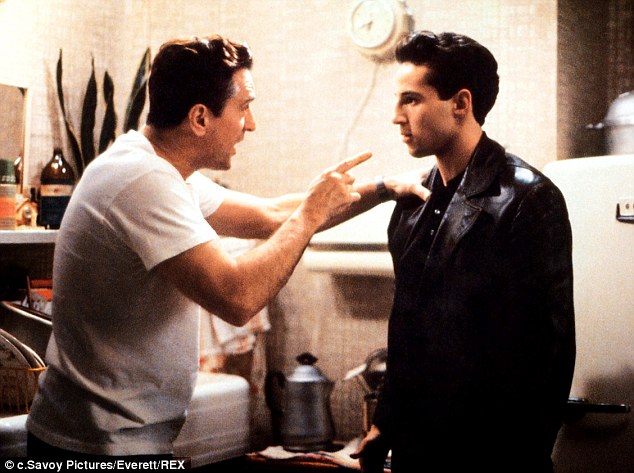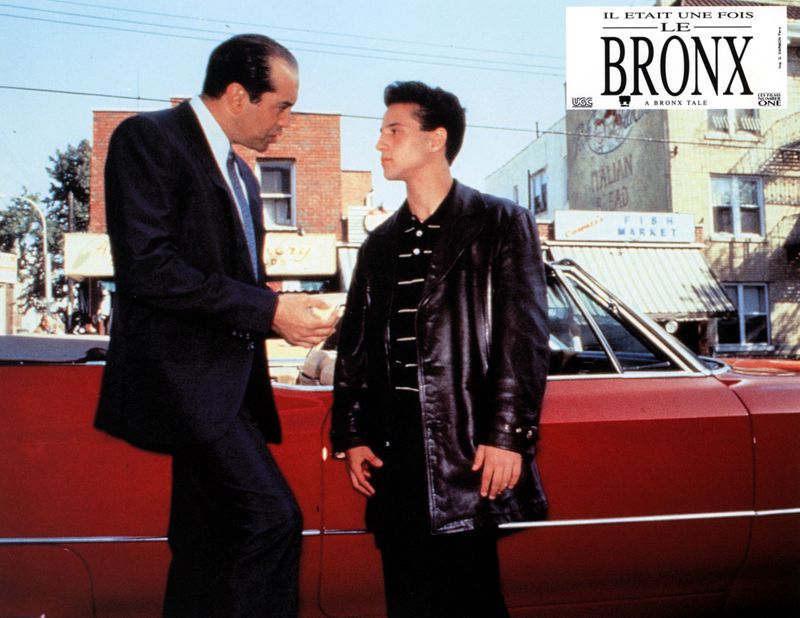A Bronx Tale (1993)
CAST: Robert De Niro, Chazz Palminteri, Lillo Brancato, Francis Capra, Kathryn Narducci, Taral Hicks
REVIEW:
For his directorial debut, Robert De Niro tells a coming-of-age tale set against the backdrop of a Bronx neighborhood under the Mafia’s influence (the screenplay was written by Chazz Palminteri, who adapted it from his own one-man play partially based on his own childhood). A Bronx Tale could be considered a “mob movie”, but that’s more the backdrop than the focus, and the movie avoids melodramatic stereotypes.
We open in 1960 in an Italian-American neighborhood in The Bronx, where nine-year-old Calogero (Francis Capra) lives with his bus driver father Lorenzo (Robert De Niro) and housewife mother Rosina (Kathryn Narducci) and spends his time hanging out on the sidewalk with friends and idolizing from afar the local mob boss, Sonny (Chazz Palminteri), who runs the bar around the corner that his parents warn him to steer clear of. One day, Calogero witnesses Sonny shooting a man, then pretends not to recognize him in a police line-up. This gets him in the door with Sonny, who takes the impressionable kid under his wing, to the consternation of his father. Eight years later, Calogero has grown into a young man with his own street gang and two clashing father figures in the forms of Lorenzo and Sonny, and becomes embroiled in 1960s racial tensions when he falls for an African-American girl, Jane (Taral Hicks). Ultimately, events converge to draw Calogero into the violence both his father and Sonny, in different ways, had sought to keep him out of.
One of the things A Bronx Tale does to give a nuanced portrayal is that it doesn’t vilify Sonny. While we get an early glimpse of his capacity for cold-blooded violence, Sonny is outwardly an affable guy, at least when unprovoked, and it’s clear that, while Lorenzo resents his influence over his impressionable son, both men, in their own ways, care for Calogero and have his best interest at heart. Both drop nuggets of wisdom—“nothing is more tragic than wasted talent”, his father warns, while Sonny pragmatically hands down the life lesson that “nobody really cares” and you have to do for yourself—and both disapprove of the violence-prone street kids Calogero surrounds himself with. Objectively, we might take Lorenzo’s view that Sonny is not a good role model or influence for an impressionable kid with a propensity for hero worship, but Sonny’s intentions toward Calogero are not sinister, even if his character is questionable. The other characters are equally nuanced; Calogero’s father Lorenzo might be a loving family man, but he’s a product of his time and prejudices, and is not supportive of the idea of his son dating a black girl (by contrast, Sonny lends him his Cadillac to impress her). And even as he becomes infatuated with a black girl, Calogero is also a product of his environment, half-heartedly attempting to intervene when his friends assault black cyclists in the street and blurting out a racial slur in a moment of anger. Also, in the person of Calogero’s father Lorenzo, we have an Italian character who plays against the stereotype by wanting no part of the Mafia or their money (Sonny offers him $150 a week for minor messenger duties; he flatly refuses). A Bronx Tale is less a traditional “gangster movie” than a coming-of-age tale about an impressionable young man with an angel and devil—albeit not quite so black and white—perched on each shoulder and having a tug of war over his life direction. A Bronx Tale is not an action movie, or a thriller, or filled with gangland violence. There’s a couple bursts of it—the shooting early in the movie, and a couple climactic incidents—but they’re few and far between. It has a leisurely pace for the most part, and the tone slips smoothly between humor and drama, with dashes of romance and violence (though neither gets huge amounts of screentime). There’s nothing nearly so dramatic as any big gang shootout, but the low-key tone keeps things feeling more “slice of life” (perhaps the feeling of authenticity stems from it being at least partially based on Chazz Palminteri’s own youth). A Bronx Tale may be counted as an entry in the gangster movie genre, but it’s not so much a “gangster movie” as a coming-of-age drama that happens to feature gangsters.
The movie does an immersive job with capturing the 1960s Bronx, not only in obvious ways like the period cars and clothes, etc., but making a significant subplot out of the brewing racial tensions; blacks are slowly filtering into a neighborhood where they had previously been unknown, and many people, including Calogero’s friends, are not happy about it. This puts Calogero in an awkward situation when he becomes attracted to a black girl who returns his feelings, and he gets heat from both his own friends and Jane’s brother. But even after having his own mind broadened a little, Calogero is susceptible to peer pressure, and the climax of the movie hinges on him ending up in a car he doesn’t want to be in, on his way to do something he doesn’t want to be part of, with people that both his father and Sonny had warned him about.
 For his part in front of the camera, Robert De Niro, who’s not a stranger to playing hard-boiled criminals, is instead in “average Joe” mode, playing Lorenzo as an honest working man who tries to impart the same values to his son and is dismayed by Sonny providing a competing father figure. His performance is subdued for the most part, but he gets a juicy confrontation with Sonny, and a couple of forceful monologues (“You want to see a real hero? Look at a guy who gets up in the morning and goes off to work and supports his family. That’s heroism,” he insists at one point). Lorenzo is not a rebel or a troublemaker; he just wants to keep his head down and provide for his family and avoid trouble, but he’s made of stern enough stuff that, where his son’s well-being is concerned, he’s not afraid to stand up to Sonny. He is aptly-contrasted by Chazz Palminteri, one of those actors who seems so perfectly-cast as a mobster that he’s inevitably doomed to perpetual typecasting, who plays Sonny as an affable guy who is good to those who are good to him but shows fleeting glimpses of what he’s capable of when provoked. Palminteri doesn’t play Sonny as a “villain”; he’s amiable, intelligent, sometimes even philosophical (at one point he gives Calogero the literally Machiavellian advice that it’s better to be feared than loved), but his warmth is tinged with a faintly menacing undertone. He might not show a darker side often, but we buy it exists.
For his part in front of the camera, Robert De Niro, who’s not a stranger to playing hard-boiled criminals, is instead in “average Joe” mode, playing Lorenzo as an honest working man who tries to impart the same values to his son and is dismayed by Sonny providing a competing father figure. His performance is subdued for the most part, but he gets a juicy confrontation with Sonny, and a couple of forceful monologues (“You want to see a real hero? Look at a guy who gets up in the morning and goes off to work and supports his family. That’s heroism,” he insists at one point). Lorenzo is not a rebel or a troublemaker; he just wants to keep his head down and provide for his family and avoid trouble, but he’s made of stern enough stuff that, where his son’s well-being is concerned, he’s not afraid to stand up to Sonny. He is aptly-contrasted by Chazz Palminteri, one of those actors who seems so perfectly-cast as a mobster that he’s inevitably doomed to perpetual typecasting, who plays Sonny as an affable guy who is good to those who are good to him but shows fleeting glimpses of what he’s capable of when provoked. Palminteri doesn’t play Sonny as a “villain”; he’s amiable, intelligent, sometimes even philosophical (at one point he gives Calogero the literally Machiavellian advice that it’s better to be feared than loved), but his warmth is tinged with a faintly menacing undertone. He might not show a darker side often, but we buy it exists.
Alas, when we get away from De Niro and Palminteri, we’re not on as solid ground, either dramatically or acting-wise. De Niro and Palminteri elected to “discover” non-professionals for a number of roles, and their lack of experience is a little too evident. While De Niro and Palminteri might be first-billed, Calogero is the real lead, played as a young boy by Francis Capra and then as a 17-year-old by Lillo Brancato. As a protagonist, Calogero is less interesting than Lorenzo and Sonny, partly because he falls into the pitfall of many protagonists who are more passive observer than proactive participant in the action, partly because Calogero’s wishy-washy naivete sometimes makes him a little hard to be supportive of, partly because Lillo Brancato’s acting is not strong enough to bring more to his material than what’s on the page. The second half of A Bronx Tale is shakier than the first, partly because we spend more time following around Calogero getting central focus in scenes without Lorenzo and Sonny. As his one-note love interest, Taral Hicks evidences little acting ability, and their relationship strains credibility (he blurts out the N-word in her presence during a spat with her brother, but the next night she welcomes him back as if nothing happened). The material—the dangers and difficulties inherent in an interracial romance during a volatile time of racial tensions—has potential, but stronger acting/writing could have done more with it. The rest of the cast is comprised mostly of unknowns/non-professionals, apart from a last minute cameo by Joe Pesci.
But while it’s flawed—mainly in the second half—A Bronx Tale for the most part is a solid chronicle of a slice of life in the 1960s Bronx, and first-time director De Niro evidences competence behind the camera as well as in front of it, smoothly balancing humor, romance, violence, and family drama without the tone ever feeling whiplashy. The end product might be too low-key to satisfy those hankering for more gangland violence and action, but to those for whom it appeals, this Bronx tale is worth a look.
* * *
